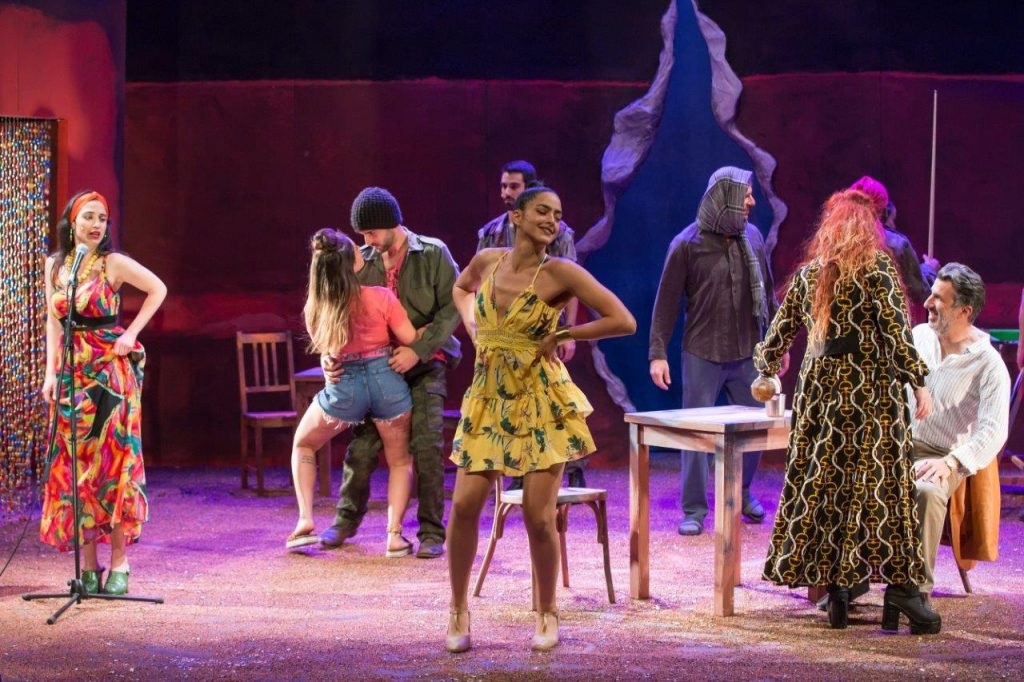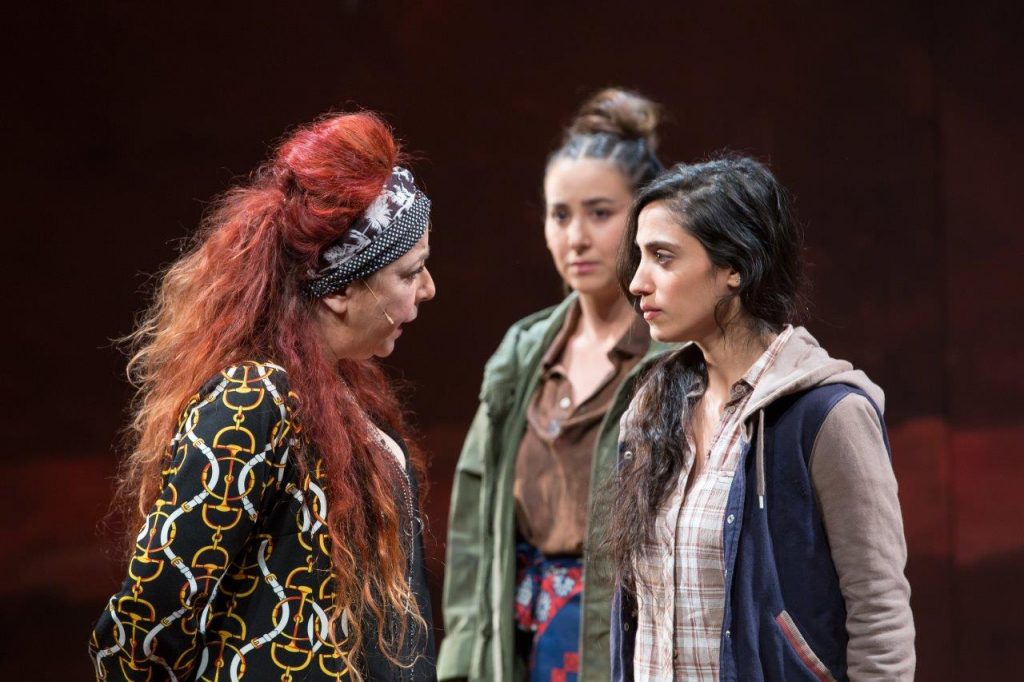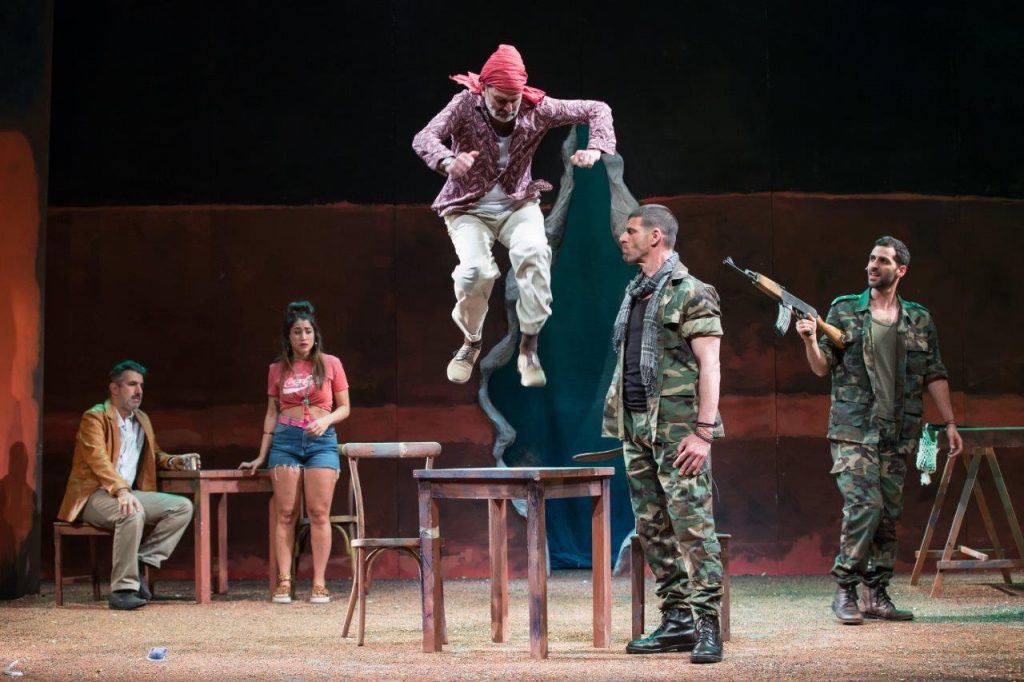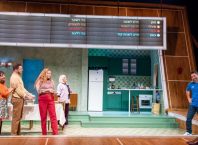
Ruined plunges the viewer into the depth of horrors painful to contemplate, and from that darkness, brings forth a play with hope and heart. Director Ido Ricklin has chosen the title “Hefker” for his Hebrew version of Lynn Nottage’s play, reflecting the “no-man’s land” on the edge of a tropical forest, between warring soldiers and rebels in the Democratic Republic of Congo, where the drama takes place, in Mama Nadi’s bar and brothel. The word “hefker” in Hebrew has several interpretations, including a legal definition of “ownerless property” as well as the connotation of lawlessness and anarchy, with a suggestion of immorality; contributing reverberations of meaning within the context of the play. Alexander Lisyansky’s simple yet evocative set, with its fields of layered color reminiscent of a Rothko painting, alludes to the heat of the country and conflict, while conveying a strong sense of the boundary between inside and outside. We, the viewers here in Israel, are outsiders, yet the play immerses us in the most intimate of interiors, the lives of women in a country where rape is a weapon of war.
In approaching the work of an American writing about Africa, and perhaps all the more so, an Israeli production of such a play, one might be wary of encountering a grim reportage of statistics, a collage of politically correct slogans or an album of sentimental stereotypes. Fear not. Lynn Nottage’s extensive research and interviews with women in Africa inform the play and give it depth and heft, yet it is not didactic and never dry. Ruined conveys not only the plight of its protagonists, but their lives. The trajectory of narrative and characters does not shy away from complexity, revealing unexpected aspects and choices. Spirited and suspenseful, the play surges with vibrant energy and intriguing characters illuminated by outstanding performances. Music and movement are the rhythm and song of life in Ruined, expressing its contradictory harsh realities, tensions, beauty and moments of tenderness.
Mama Nadi (Sarit Vino Elad) is a tough businesswoman, content to sell her watered-down whiskey to anyone who can pay. She does not take sides in this war; her only mission is to survive. One might be tempted to compare Mama Nadi to Mother Courage, yet the resemblance is one of surfaces alone; Mama Nadi’s perspective and motivation are very different. Vino-Elad’s performance conveys the contradictions embodied by Mama Nadi, the viewer may be by turns repelled by the brutality of her actions, all too aware of her vulnerability, then suddenly surprised and mystified by her capacity for compassion. Soldiers, rebels, miners and traders comes to the bar where Mama Nadi makes the rules, and all who enter must disarm their weapons in this no-war zone. Yet as the drama unfolds, the risks she takes and fragility of her reign become more and more apparent.
Into the establishment enters Christian (Amir Krief), a dapper poet and recovered alcoholic with merchandise to sell. His banter and negotiations with Mama Nadi are edgy and ambivalent; is this business or pleasure? Moments into the play, the viewer is hit with the shocking realization that the merchandise they are bargaining over are two women: Salima (Maayan Turgeman) and Sophie (Reut Alush). Salima was kidnapped from her home, held captive and repeatedly raped. Finally free after five months, she was rejected by her husband and village, for a woman who has been raped dishonors her family and brings shame on her community. With nowhere to go, working in Mama Nadi’s brothel is a way to survive. Sophie’s circumstances are dire: raped with a bayonet, her genitals destroyed, she is ruined. Even Mama Nadi does not want to take her in.

One of the play’s strengths is that it does not insist on the otherness and victimhood of the women in the brothel, but rather presents them as individuals who had plans for their lives, plans that were cruelly destroyed. Salima led a simple life in a small village, living happily with her husband and baby daughter, while Sophie had been planning to attend university, and the lovely dancer Josephine, the daughter of a Chief, cherishes hopes of a better future. They are alive, and to be alive is to dream, to hope. Mama Nadi uses these women for her own survival, yet she is offering them a chance to stay alive. Love, family, and a place in the community may no longer be a possibility for them, but the play emphasizes the importance of having the economic means to survive. Money has no gender; it is the only way to reclaim power and agency.
Yet violence is always a breath away. Whenever either the rebel leader Jerome Kissembe (Pini Gueta) or Commander Osembenga (Oded Leopold) enter the bar, the air is thick with impending danger. Oded Leopold brings a powerfully ominous presence to his portrayal of the military officer, heightening the tension and suspense.
The play is permeated with a sense of dissonance. Live music, composed by Elad Lidor, accompanies the performance throughout, with a percussionist (Dani Shapira) and guitarist (Avner Tueg) onstage, the former taking on the role of narrator as well, announcing the vicissitudes of war, as rebels and soldiers alternate in gaining the upper hand. Sophie, who cannot fulfill the traditional job definition at Mama Nadi’s, earns her keep by singing. Reut Alush has a lovely voice – listening to Sophie, seeing the beauty in her, one is easily swept away, but then inevitably, one remembers the painful reality of her existence. The moments of beauty and light are ephemeral, fragile.

As time passes and the battles are unrelenting, the tension mounts. In this very woman-centered play, the trajectory of poet-salesman Christian is fascinating to follow. Amir Krief brings a playful lightness to the portrayal of the wordsmith who represents a different kind of man. Horrified by the violence of the war, bullied and rendered helpless by Commander Osembenga, Krief imbues Christian’s downward spiral with poignancy and integrity that shines through the ravaged, wild, and weak façade, revealing a glimmer of a man who may yet be redeemed.
In one of the play’s strongest musical numbers (that elicited a round of spontaneous applause), with Mama Nadi and Sophie both singing, there is a line that resonates powerfully: the world is going to die but here we are having the time of our lives (my rough translation from the Hebrew). Like Mama Nadi’s bar, the theatre offers shelter from the war zone, the political-economic storm, the battle of daily life – to rest and experience pleasure. Yet in that distance, that rest, it also provides the perspective from which to examine the burning issues of our lives, and to come closer to understanding the lives and feelings of others.
Ruined
By Lynn Nottage; Hebrew Version and Director: Ido Ricklin; Music: Elad Lidor; Set: Alexander Lisyansky; Costumes: Ula Shevstov; Lighting: Adi Shimromy; Choreography: Ariel Wolf; Fights Coordinator: Uri Bustan; Cast: Percussionist – Dani Shapira; Guitarist – Avner Tueg; Mama Nadi – Sara Vino Elad; Christian – Amir Krief; Sophie – Reut Alush; Salima – Maayan Turgeman; Josephine – Danielle Menuchin; Emeline – Sapir Manor; Aziz Harari – Udi Ben-David; Jerome Kissembe/Miner – Pini Gueta; Commander Osembenga/Miner – Oded Leopold; Laurent/Rebel – Itamar Eliyahu; Fortune/Rebel/Miner – Oren Cohen; Simon/Rebel/Soldier – Gil Ari Cohen.





